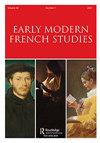Undead Dindenault: economics, theatre, and economic theatre in Rabelais’s Quart livre and beyond
IF 0.1
3区 历史学
Q2 HISTORY
引用次数: 0
Abstract
This article is primarily concerned with the Dindenault episode (chapters V-VIII) of François Rabelais’s Quart livre, which deals with economic and theatrical themes simultaneously. While previous studies have tackled these themes separately, I outline how they ought to be considered in tandem and, indeed, rely on one another for significance. I argue that in the Dindenault episode, Rabelais’s use of common theatrical structures and motifs serves as a stage upon which to mount socio-economic critique, constituting a performance of theatrical economics, in the context of a broader example of economic theatre. I then turn to one of the nineteenth-century afterlives of Rabelais’s texts – Théodore Labarre’s and Henri Trianon’s 1855 opera Pantagruel – claiming that the interdependence of the Dindenault scene’s economic and theatrical themes is retroactively confirmed by its move into one of its ‘downstream contexts’: the shepherd’s scandalous afterlife on the musical stage of Second Empire France.不死的Dindenault:拉伯雷《夸脱生活》中的经济、戏剧和经济戏剧
本文主要关注弗朗索瓦·拉伯雷的《四章生活》中的Dindenault章节(第v - 8章),该章节同时涉及经济和戏剧主题。虽然以前的研究分别处理了这些主题,但我概述了它们应该如何被串联起来考虑,并且实际上是相互依赖的意义。我认为,在Dindenault的情节中,拉伯雷使用了常见的戏剧结构和主题,作为一个舞台,在这个舞台上进行社会经济批评,在更广泛的经济戏剧例子的背景下,构成了戏剧经济学的表演。然后,我转向拉伯雷文本的一个19世纪的来生——thsamodore Labarre和Henri Trianon 1855年的歌剧Pantagruel——声称,Dindenault场景的经济和戏剧主题的相互依赖性,通过它进入其“下游语境”之一而回溯地得到证实:第二帝国法国音乐舞台上牧羊人的丑闻来生。
本文章由计算机程序翻译,如有差异,请以英文原文为准。
求助全文
约1分钟内获得全文
求助全文
来源期刊

Early Modern French Studies
Multiple-
CiteScore
0.10
自引率
0.00%
发文量
14
期刊介绍:
Early Modern French Studies (formerly Seventeenth-Century French Studies) publishes high-quality, peer-reviewed, original articles in English and French on a broad range of literary, cultural, methodological, and theoretical topics relating to the study of early modern France. The journal has expanded its historical scope and now covers work on the sixteenth, seventeenth, and eighteenth centuries. Within this period of French literary and cultural history, the journal particularly welcomes work that relates to the term ''early modern'', as well as work that interrogates it. It continues to publish special issues devoted to particular topics (such as the highly successful 2014 special issue on the cultural history of fans) as well as individual submissions.
 求助内容:
求助内容: 应助结果提醒方式:
应助结果提醒方式:


